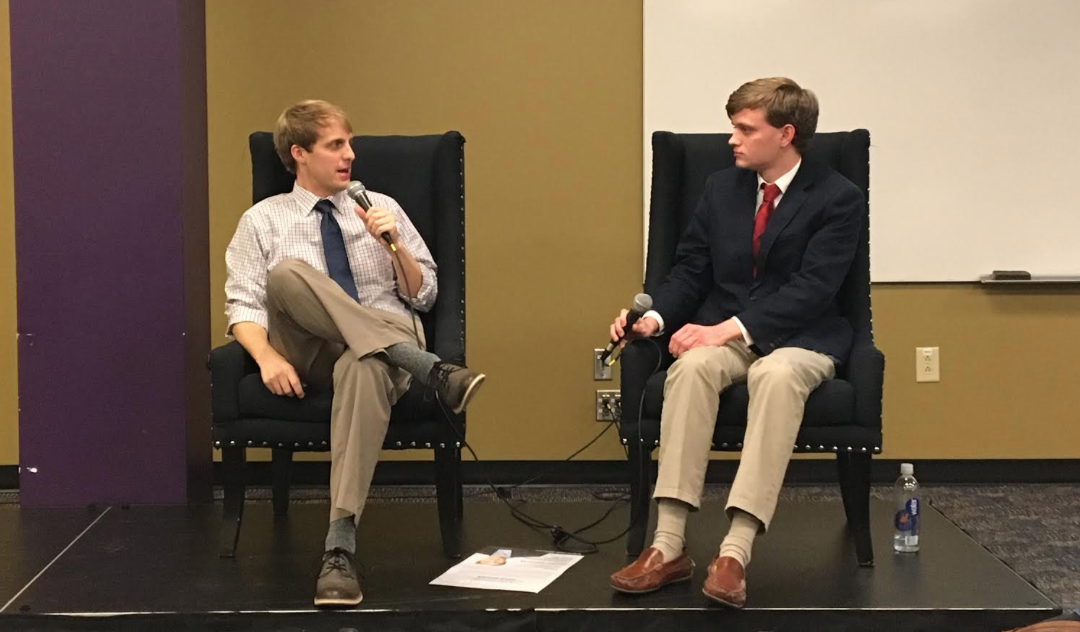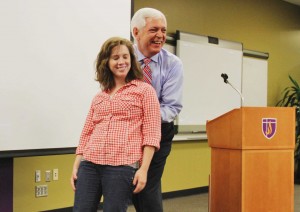
by Bailey Burnett | Oct 2, 2019 | News Slider
Former local news anchor Lydia Lenker advised Lipscomb communication and journalism students to “enjoy the journey” while chasing life’s opportunities during the school year’s inaugural installment in the Media Masters Series. That series, hosted by the Department of Communication and Journalism, brings media professionals to campus to offer insight to students as they ponder their futures. As a part of the advice she offered students, Lenker urged them to call and reach out to people to get their names out there, elevate their profiles. “This town is so full of media opportunities. Make the first move, share information, and build trust,” she said. She reminded students to be aware of — and careful with — their social media presence. “Employers go right to social media to see what you are all about,” she said. “Be really aware of your virtual footprint.” Lenker brought tons of experience to the appearance. After Lenker graduated from Temple University, she worked in numerous roles behind the scenes in TV production, as well as some on-air radio positions. Eventually, Lenker worked her way up to her dream position of a reporter/anchor at NewsChannel 5 in Nashville, where she won an Emmy for “Best Weekend Newscast” in the Southeast region. She also was known among the news media, locally, for her strong reporting about the state Legislature and the governor. That pretty much set the stage for the non-broadcast part of her career. After her 16-year stint as a reporter and anchor with NewsChannel 5, Lenker became the press secretary for Tennessee Gov. Phil Bredesen during his initial campaign and continued in that role through...

by Quinn Gorte | Jan 29, 2019 | News Slider
The Tennessean’s Vanderbilt beat reporter Adam Sparks came to campus to speak to Lipscomb students about the importance of being flexible and honest in their careers. Lipscomb hosted its first Media Masters of the semester on Tuesday evening, with sophomore journalism major Spencer Boehme interviewing Sparks during the evening. Sparks, a graduate of MTSU, has been a sports writer for 19 years. He has won numerous journalism awards, including National Beat Writer of the Year. Throughout his writing career, he has covered a variety of stories, from reporting on the Titans and the Nashville Sounds to flag football and elementary basketball. Sparks encouraged Lipscomb students to be open to a variety of job opportunities, paid or unpaid. “If you are given an opportunity to work, you say ‘Yes,’” said Sparks, noting that unpaid or low-pay opportunities should not necessarily be looked down upon. “You have to get your foot in the door, [in] some way or some fashion,” Sparks said. Sparks gave an example from his own life, explaining that he often accepted reporting opportunities that were generally looked down upon, an attitude and choice which Sparks said he believes gains reporters respect. He also discussed the importance of work flexibility to non-journalism careers, sharing a story of his friend who wanted to be a loan officer but finally accepted a job as a bank teller, due to his lack of experience, and was later promoted to vice president. “The reason he got there is he finally said, ‘I’ll take whatever bottom position you’re offering me,’” Sparks said. In addition to his career as a professional reporter, Sparks is also...
by Erin Turner | Jan 20, 2015 | News Slider
He does it all — everything from serving in church ministries to playing latin percussion music in his spare time. And his diversity doesn’t stop there. Anthony Carter, Chief Diversity Officer at Johnson & Johnson, spoke to students about the importance of diversity in the workplace at Media Masters Tuesday evening in Ezell. To get where he is today, Carter took a slight detour on his journey into the field of communications. “It took me three hours in a laboratory to prick my finger to do a blood test and I knew right away that this [pre-med] is not really for me,” Carter said. During college, one of his professors invited him to do a radio talk show, giving him the chance to bring current topics to students on campus. Soon, this broadcast endeavor led him to writing for one of his school’s newspapers. “I started to fall in love with this thing called communications because I ultimately thought that it was the true way to express who I am.” His love of communications took him down another path, incorporating both diversity and inclusion. “Diversity is who we are and inclusion is how we work together,” Carter said. “Communications is the understanding of all of that.” In 2002, Carter joined Johnson & Johnson as Director of Corporate Communications, and in 2005 he was promoted to Vice President of Corporate Communications. A day in the life of Carter involves sifting through hundreds of emails and doing exactly what he loves — creating an atmosphere of transparency with those he works with. “My passion in that work [communications] makes me really comfortable in...
by Sam Webb | Nov 11, 2014 | News Slider
Cracker Barrel communications representative Maria Janella Escobar spoke to the importance of corporate communication at November’s installment of Media Masters Monday night in the Ezell Center. Escobar is the director and head of corporate communications at the restaurant. She worked with FedEx, Hilton Hotels and St. Jude Children’s Research Hospital before joining Cracker Barrel’s communications team. Corporate communication is a multi-faceted field, mixing various elements of the business world into relaying a message to those in the public. Part of Escobar’s work involves communicating the Cracker Barrel brand to the company’s audience. Those duties include refining the marketing campaign. She explained that businesses have to find a way to relate to their customers through marketing. “It’s just talking to people, and that is how people relate to companies and brands.” Escobar said. Escobar also explained the difference between a crisis and an issue in the corporate communications world. A crisis is an unexpected event that cannot be prepared for. An issue is a reoccurring problem that can be prepared for. She said that accountability is a must when working in communications. “When you make a mistake, you have to admit you made a mistake,” Escobar said. A big part of any company is working in the present to ensure a bright future. Escobar said she hopes the popular country-themed restaurant’s reputation can grow while still maintaining the brand’s timeless value. To Escobar, the company needs to remain true to its traditional values and atmosphere, opposed to rebranding campaigns that many restaurants are undergoing. The communications expert took questions from the audience, sharing her knowledge with the communication-minded crowd of...

by Erin Turner | Sep 15, 2014 | News Slider
Phil Williams is no liar. He is an award-winning investigative reporter who always seeks to tell the truth. “You never can tell who’s telling the truth and who’s telling you a lie unless you’re willing to do the hard work of testing it,” Williams said to a group of communication students at Lipscomb’s first Media Masters event of the school year. To illustrate the mindset of an investigative reporter, Williams called on a volunteer from the audience to close their eyes and do the trust test with him. “All of your life you’ve been told ‘learn to trust people.’ “Well, the mindset of an investigative reporter is ‘trust no one.'” Williams discovered early on that a journalist should always be a truth seeker, constantly seeking not just an answer, but a truthful answer. “With a lot of people that you will interview as a journalist, telling the truth is not exactly what they have in mind. They want to put their spin on the truth rather than just coming out and acknowledging it.” “We live in a world where truth isn’t always the best defense because sometimes a lie is much more powerful.” When working on investigative work, Williams suggests to first determine the truth if possible. If the truth cannot be supported with proper evidence, Williams explains that it is always best to give both sides of the story. “I think you have to deliberately put your biases and suspicions aside to tell the truth as much as you can. “I have great faith in the public to decide for themselves to decide if someone’s telling the truth or...




